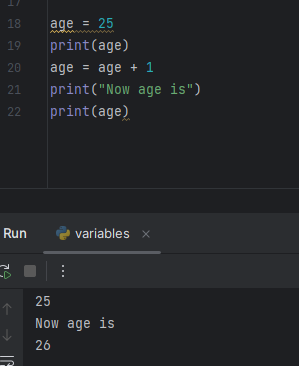Introduction :
Python, a versatile and popular programming language, owes much of its power to the concept of variables. Variables are the building blocks of code that allow you to store and manipulate data. In this blog, we'll delve into the world of Python variables, exploring their fundamentals, usage, and best practices.
What are Variables?
At its core, a variable in Python is a symbolic name that references a value in memory. These values can range from numbers and strings to more complex data structures. Variables serve as a means of storing and managing information that your program can work with dynamically.
1. Declaring and Assigning Variables:
In Python, declaring a variable is as simple as giving it a name and assigning a value using the `=` operator:
2. Variable Naming Rules:
Python has certain rules and conventions for naming variables:
i. Variable names can include letters, digits, and underscores.
ii. The first character must be a letter or underscore.
iii. Names are case-sensitive (`age`, `Age`, and `AGE` are distinct variables).
iv. Avoid using Python keywords (reserved words) as variable names.
v. Choose descriptive names that convey the variable's purpose.
3. Data Types and Type Conversion:
Variables in Python are dynamically typed, meaning their data type is determined by the value they hold. Common data types include:
1. int for integers (e.g., age = 25)
2. float for floating-point numbers (e.g., pi = 3.14159)
3. str for strings (e.g., name = "Alice")
4. bool for Boolean values (True or False, e.g., is_student = True)
You can convert between types using functions like `int()`, `float()`, and `str()`:
4. Reassigning Variables:
Variables can change their values after being assigned:
5. Multiple Assignments:
Python allows you to assign multiple variables in a single line:
6. Variable Interpolation:
You can embed variable values into strings using f-strings or the `format()` method:
Scope and Lifetime of Variables:
Variables have different scopes, which define where they can be accessed. Understanding scopes prevents unintended variable clashes and enhances code organization.
Variables also have lifetimes, which determine when they are created and destroyed. Local variables within a function exist only within the function's execution, while global variables persist throughout the program.
For Best Practices :
1. Use descriptive variable names to enhance code readability.
2. Follow naming conventions (e.g., lowercase with underscores for readability).
3. Avoid using single-letter variable names except for counters or iterators.
4. Use comments to explain the purpose and context of your variables.
5. Keep variable scope in mind to prevent bugs and unexpected behavior.
6. Initialize variables before using them to avoid errors.
Conclusion:
Variables are the cornerstone of any programming language, and Python's elegant syntax makes working with them a breeze. Whether you're a beginner or an experienced programmer, mastering variables is essential for building robust and efficient Python applications. By following best practices and understanding the nuances of scope and lifetime, you'll write cleaner and more maintainable code. So, go ahead and harness the power of variables to unlock your programming potential in Python!





